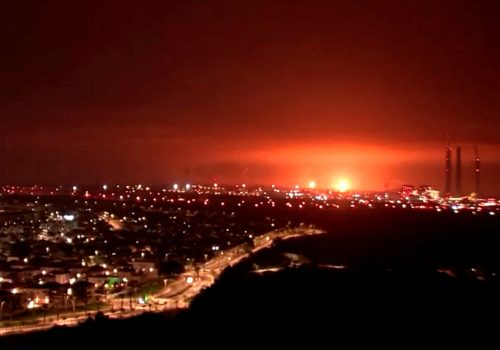Israel’s neighbors are in dire financial straits. Here’s what that could mean for the war in Gaza.
As the Biden administration works to prevent regional escalation in the Israel-Gaza crisis, it should recognize one key difference from previous iterations of the conflict. Israel’s neighbors—notably Egypt, Jordan, and Lebanon—are in a more dire economic situation today than they have been during any of the last major crises with Israel in this century.
Our team analyzed the relative strength and weakness of these countries using the “Misery Index”—the sum of the inflation and unemployment rates—weighting the data by GDP.
The results clearly show how this time is different, from an economic perspective. Today, the Misery Index for these countries is higher than at any point since 2000.
Egypt’s inflation soared to 38 percent in September and its currency reserves are rapidly drying up. Lebanon has had triple-digit inflation for the past three years and its entire economy is in crisis. Jordan is comparatively better off but unemployment has hit a new high of 22 percent in 2023.
While past flashpoints posed challenges for Israel’s neighbors, they did not have to contend with the risk of recession or worse at the same time. And that means that economic statecraft by the United States and its partners could be particularly effective in navigating the current crisis.
Right now, policymakers are rightly focused on how to limit Iran’s involvement in the conflict—largely through “negative” economic statecraft like sanctions. But economic statecraft has a “positive” side, too, comprised of policies that reward countries for desired behavior. Those inducements have the potential to be particularly effective given the economic difficulties that Israel’s neighbors face.
For instance, there is currently a $5 billion stalled IMF program and Cairo is desperate to have access to at least part of the money. Jordan was supposed to receive a $100 million loan from Japan for an upgrade to its electricity grid. Before October 7, France had committed (but not yet fully sent) over 30 million euros in financial relief to Lebanon.
There are dozens of similar financial levers the West could pull in the days ahead to get more collaboration on the Rafah crossing for humanitarian relief, reconstitute the cancelled Arab Leaders Summit in Amman with President Biden, and send a deterrence signal to Hezbollah to avoid escalation in the north. If ever there was a moment to leverage the combined influence of the dollar, pound, euro, and yen this is it.
There are limits to this approach that the Biden administration should also bear in mind.
In 1956, US Secretary of State John Foster Dulles informed Egyptian President Gamal Abdel Nasser that the United States was withdrawing its financial support of $70 million (nearly $800 million in today’s dollars) for the construction of the Aswan Dam on the Nile. Dulles was upset that Egypt had formally recognized the new communist Chinese government in Beijing (and abandoned the nationalists in Taiwan). He thought Egypt’s economy was so weak they couldn’t build the dam without US support. He was wrong. The Soviets stepped in. An emboldened Nasser nationalized the Suez Canal, which brought the UK, France, and Israel into a war.
Today, Gulf states like Saudi Arabia and Qatar are in a much stronger economic position—closer to Israel’s than its neighbors’—and they could step in to fill the void.
One of the lessons from 1956 is that if countries don’t get support from the West, they will get it from somewhere else. With China serving as the world’s largest bilateral lender, that’s even more likely today than it was then.
The bottom line is that all conflicts, especially those of the past several years, have a military and economic dimension. It’s time for the G7 to start using all the tools at its disposal.
Josh Lipsky is the senior director of the Atlantic Council’s GeoEconomics Center and a former adviser at the International Monetary Fund.
Phillip Meng, Niels Graham, and Sophia Busch contributed to this piece. This post is adapted from the GeoEconomics Center’s weekly Guide to the Global Economy newsletter. If you are interested in getting the newsletter, please email SBusch@atlanticcouncil.org.

At the intersection of economics, finance, and foreign policy, the GeoEconomics Center is a translation hub with the goal of helping shape a better global economic future.
Further reading
Fri, Oct 27, 2023
Experts react: What to know about Israel’s expanding military operations in Gaza
New Atlanticist By
In what could signal the initial steps of a larger invasion, Israel has announced that it is “expanding” ground operations in Gaza, with the goal of eradicating Hamas.
Tue, Oct 10, 2023
Live expertise: Get the latest insight on the Israel-Hamas war
New Atlanticist By
Atlantic Council experts are analyzing the rapidly unfolding events in the Middle East as they happen. Find the latest here.
Sat, Oct 28, 2023
Israel’s ground war in Gaza has started. How will it end?
Fast Thinking By
On October 28, Israeli Prime Minister Benjamin Netanyahu announced that a “second stage” in Israel’s war is intended to destroy Hamas in Gaza. Atlantic Council experts share their insights.
Image: US Secretary of State Antony Blinken meets with Egypt's President Abdel Fattah El-Sisi at Al-Ittihadiya Palace in Cairo, Sunday Oct. 15, 2023. Jacquelyn Martin/Pool via REUTERS


